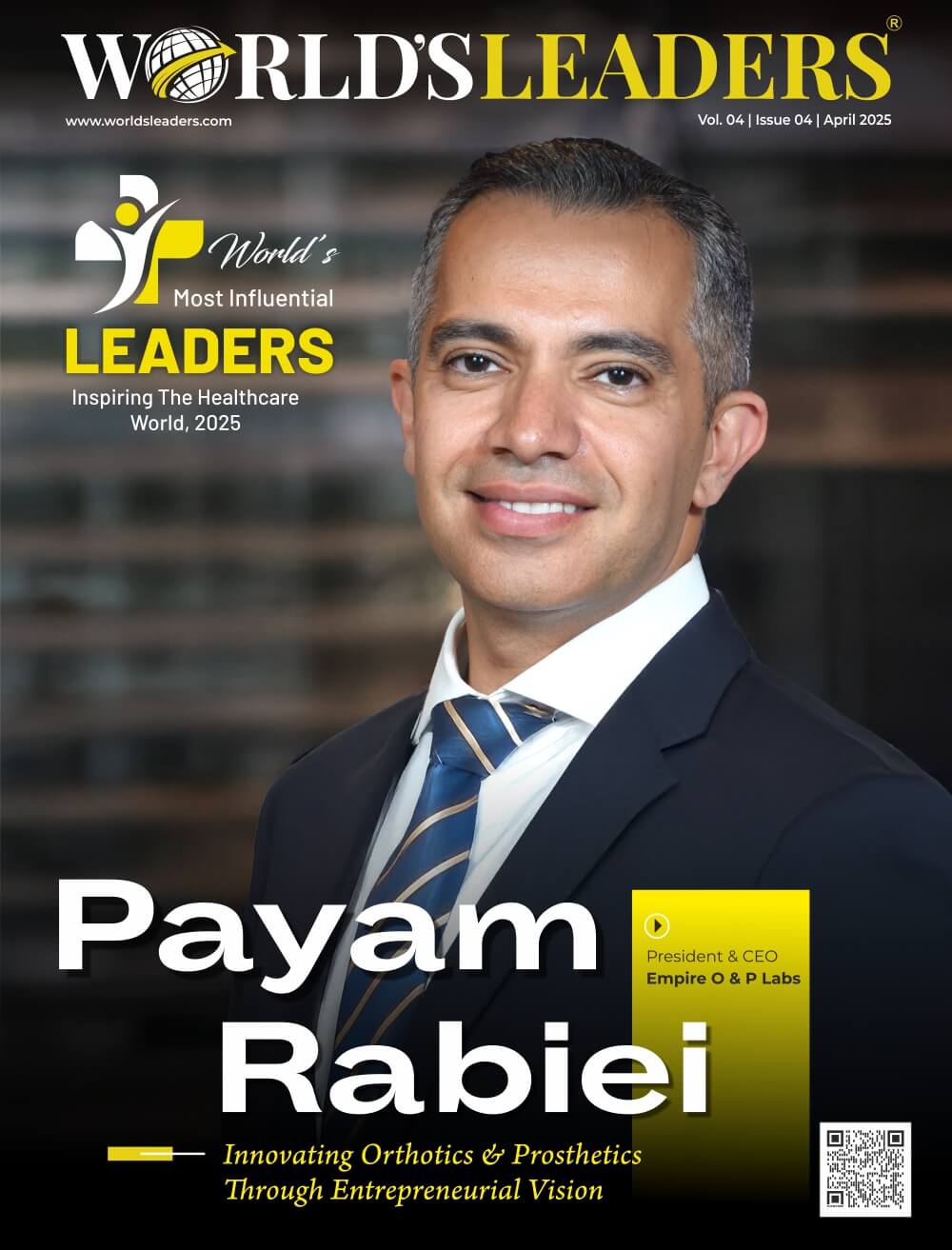With a career defined by dedication, innovation, and a relentless pursuit of excellence, Dr. Georgios Matis is a leading expert in neuromodulation techniques for managing chronic pain and spasticity. His journey began at Aristotle University of Thessaloniki, Greece, where he earned his medical degree, followed by a Master’s in Health Services Management at the Hellenic Open University in Patra. Dr. Matis’s deep commitment to scientific advancement led him to pursue a PhD at the Democritus University of Thrace, further enriching his expertise in neuroscience and medical research.
Today, with over seven years as the Head of the Pain and Spasticity Section at Uniklinik Köln, Dr. Matis is at the forefront of transformative treatments such as spinal cord stimulation, peripheral nerve field stimulation, intrathecal therapies, and advanced techniques like thermocoagulation of the trigeminal ganglion and pulsed radiofrequency. His work has brought renewed hope and improved quality of life to patients suffering from debilitating conditions.
Dr. Matis’s clinical training, rooted in Greece at institutions like the General Hospital of Polygyros and University Hospital of Alexandroupolis, and enriched by service at the 417 Military Hospital in Athens, laid the foundation for his compassionate approach to patient care. His global perspective was further shaped by prestigious research roles at Weill Cornell Medical College’s Skull Base Lab in New York and the Department of Neuroradiology at the University Hospital of Zurich, where he collaborated with leading experts in the field.
Reflecting on his journey, Dr. Matis asserts, “Each phase of my career has been a stepping stone toward my current role at Uniklinik Köln, where I am committed to the promise of neuromodulation in transforming lives.” His passion for blending cutting-edge science with empathetic care continues to drive his work, setting a benchmark in the treatment of chronic pain and spasticity.
Aligning Precision and Compassion
Dr. Matis exemplifies a rare blend of clinical expertise, innovative research, and compassionate patient care. His leadership in the specialized fields of spinal cord stimulation and intrathecal drug delivery has positioned him as a key figure in neuromodulation, a transformative area of medicine dedicated to managing chronic pain and spasticity.
Dr. Matis’s role is inherently multifaceted. Every patient presents a unique clinical puzzle, requiring meticulous assessment of their pain profile, neurological condition, and quality-of-life aspirations. For many, he devises highly individualized treatment plans, often culminating in complex neuromodulation surgeries. His clinical precision is matched by a commitment to patient-centered care, ensuring that each decision is tailored to restore not just physical well-being but also dignity and independence.
Beyond the operating room, Dr. Matis is a passionate mentor and educator, dedicated to fostering the next generation of specialists in neuromodulation. He actively trains colleagues and emerging practitioners in advanced techniques, bridging the gap between innovation and practical application. Recognizing the importance of collaboration, he builds robust networks with referring physicians across Germany and internationally, expanding access to these life-changing therapies.
His leadership extends into research, where he drives clinical trials and contributes to the growing body of knowledge in neuromodulation. Representing Uniklinik Köln on the global stage, Dr. Matis shares his expertise and findings at international congresses, meetings, and cadaver workshops. These engagements not only highlight the hospital’s advancements but also foster collaboration among medical professionals united in their mission to alleviate pain and improve lives.
For Dr. Matis, the most fulfilling part of his day is the morning rounds. Seeing patients experience profound relief—often after years of unrelenting pain or spasticity—is a humbling reminder of the transformative power of neuromodulation. “These therapies do more than manage symptoms; they restore dignity, freedom, and hope,” he reflects.
Under Dr. Matis’s leadership, Uniklinik Köln is not only a hub of clinical excellence but also a beacon of innovation and empathy. His work continues to redefine what is possible in neuromodulation, offering patients a future where pain no longer dictates the narrative of their lives.
Leading to Advancing Neuromodulation
Dr. Matis’s leadership in neuromodulation extends beyond his role as a functional neurosurgeon at Uniklinik Köln His commitment to the transformative power of medical innovation is guided by three core principles: expanding accessibility to advanced therapies, fostering innovation through collaborative research, and championing a compassionate approach to chronic pain treatment.
Expanding Access to Transformative Therapies
For Dr. Matis, chronic pain is not just a medical condition—it is a profound barrier to a meaningful quality of life. Despite remarkable advancements in spinal cord stimulation and intrathecal treatments, many patients remain unaware of or unable to access these therapies. He advocates for a more inclusive healthcare model, striving to ensure that such life-changing treatments are available to underserved communities and those marginalized by systemic barriers. “Every patient deserves the chance to reclaim their life from pain and spasticity,” he asserts, underscoring his mission to close the accessibility gap and create equity in care delivery.
Driving Innovation Through Visionary Research
Innovation in neuromodulation requires bold vision and collaboration. Dr. Matis believes in pushing the boundaries of what’s possible by integrating research, technology, and empathy. Through his involvement with the International Neuromodulation Society and interdisciplinary teams, he champions partnerships that improve existing therapies while exploring groundbreaking approaches. By fostering a culture of collaborative innovation, he seeks to position neuromodulation at the forefront of medical advancement, ensuring that treatments evolve to meet the needs of an ever-changing patient landscape.
Humanizing Chronic Pain Management
Central to Dr. Matis’s philosophy is the understanding that chronic pain affects far more than the body—it impacts identity, independence, and dignity. He emphasizes the need to place human stories at the heart of pain management, creating a culture where patients feel genuinely heard and valued. “Empathy is not optional in medicine,” he states. “It is essential to restoring hope and helping patients rediscover their sense of self.” By integrating compassion into every aspect of care, Dr. Matis seeks to redefine chronic pain treatment, shifting the focus from symptom relief to holistic healing.
Through his efforts, Dr. Matis is paving the way for a healthcare system that addresses chronic pain as the multifaceted challenge it is. His work at Uniklinik Köln, coupled with his global advocacy and research, reflects a deep commitment to providing innovative, compassionate solutions that empower patients to reclaim their lives. By expanding access, driving research, and fostering dignity in care, Dr. Matis exemplifies what it means to lead with purpose in modern medicine.
Revolutionary Treatment Modalities Implemented
Dr. Matis incorporates cutting-edge neuromodulation techniques to provide highly tailored and effective treatments for patients with chronic pain and spasticity. These innovations not only enhance therapeutic outcomes but also prioritize patient safety and quality of life:
- Closed-loop spinal cord stimulation (SCS): This advanced SCS system uses real-time feedback from the spinal cord, specifically evoked compound action potentials (ECAPs), to dynamically adjust stimulation levels. By maintaining optimal stimulation, closed-loop SCS ensures consistent and precise pain relief, addressing the variability often encountered in traditional SCS systems.
- Fast-acting sub-perception therapy (FAST) SCS algorithm: The FAST algorithm revolutionizes pain management by offering rapid relief, with patients experiencing significant reductions in pain within seconds or minutes. This approach is particularly valuable for individuals seeking immediate alleviation of symptoms.
- Combination waveforms in spinal cord stimulation: Dr. Matis leverages a mix of stimulation waveforms to manage complex pain profiles, allowing a more individualized approach to treatment. This technique is especially beneficial for patients with multi-dimensional or refractory pain conditions.
- Restorative neurostimulation for chronic mechanical low back pain: This modality targets the multifidus muscles, which play a key role in stabilizing the lumbar spine. Restorative neurostimulation not only alleviates pain but also strengthens the muscles, addressing the root causes of chronic mechanical low back pain and promoting long-term recovery.
- Intrathecal application of ziconotide: As a non-opioid analgesic, ziconotide offers effective pain relief without the risks associated with opioid therapies, such as dependency or tolerance. Administered intrathecally, it provides targeted pain management for patients with severe or intractable pain.
These innovative modalities reflect Dr. Matis’s commitment to advancing the field of neuromodulation and improving patient outcomes. By combining state-of-the-art technology with a patient-centric approach, he addresses complex pain conditions with precision and compassion.
The Balance of Skill and Empathy
For Dr. Matis, hiring the right team member involves far more than evaluating technical proficiency. While expertise in neuromodulation therapies such as spinal cord stimulation and intrathecal treatments is essential, Dr. Matis believes that the transformative potential of these interventions requires qualities that go beyond clinical skills.
“Empathy and resilience are non-negotiable,” he asserts. “Each patient we treat is enduring the profound weight of chronic pain or severe spasticity—conditions that ripple through every aspect of their lives. To make a meaningful impact, a team member must see the person behind the diagnosis.”
Dr. Matis emphasizes that neuromodulation is deeply personal, with therapies impacting not only physical symptoms but also patients’ emotional and psychological well-being. Ideal candidates are those who approach their work with intellectual curiosity, staying at the forefront of advancements in the field, while remaining deeply committed to dignified care. This dual commitment ensures they can address the intricacies of the treatments while respecting the vulnerability of the patients they serve.
As a member of the International Neuromodulation Society, Dr. Matis understands the importance of fostering a culture of innovation and education. His work involves not only pioneering advanced solutions but also inspiring others to appreciate the life-changing impact of neuromodulation. He seeks team members who align with this mission, individuals who view their role as both a privilege and a responsibility.
In due course, Dr. Matis looks for candidates who demonstrate a unique balance of analytical rigor and emotional intelligence. “We need professionals who are as devoted to advancing their clinical skills as they are to listening to patients’ stories,” he explains. This combination ensures that his team continues to innovate while staying rooted in the core purpose of their work: restoring hope, dignity, and quality of life to those who need it most.
Turning Risks into Rewards in the Pursuit of Neuromodulation Excellence
For Dr. Matis, the greatest professional risk came a decade ago when he left his home country of Greece at the age of 37. Embarking on an entirely new chapter in Germany, Dr. Matis faced a daunting challenge: navigating an unfamiliar language, integrating into a new healthcare system, and delving into the emerging field of functional neurosurgery.
“I wasn’t sure if I could master the techniques or even secure a medical license in this foreign land,” he reflects. “But what drove me forward was an unwavering vision to help patients suffering from chronic pain.”
What began as a leap of faith has since evolved into a flourishing career. Dr. Matis is now a leading figure in neuromodulation therapies, specializing in spinal cord stimulation and intrathecal treatments. His willingness to take a bold risk not only shaped his professional trajectory but also laid the foundation for life-changing care for countless patients.
Looking ahead, Dr. Matis envisions a transformative future for his department. Over the next five years, he aims to establish Uniklinik Köln as a global hub for innovation in neuromodulation—a center where international experts convene to collaborate, learn, and drive the field forward. His vision includes forging strong partnerships with medical device companies to ensure patients have access to the latest technological advancements.
“We’re not just treating chronic pain,” he says. “We’re restoring hope, dignity, and quality of life for those who need it most.”
Under Dr. Matis’s leadership, the department is poised to push the boundaries of medical science while maintaining an unwavering commitment to patient-centered care. By blending bold innovation with compassionate treatment, he is not only shaping the future of neuromodulation but also exemplifying the transformative power of calculated risk.
Blending Innovation and Empathy to Lead Neuromodulation’s Future
Dr. Matis exemplifies the modern visionary leader in medicine, seamlessly integrating scientific innovation with patient-centered care. As a functional neurosurgeon specializing in neuromodulation at Uniklinik Köln, he operates at the forefront of rapidly advancing fields such as spinal cord stimulation and intrathecal therapies. This dual commitment to cutting-edge technology and empathetic healthcare is the cornerstone of his leadership philosophy.
To remain a pioneer in his field, Dr. Matis embraces continuous learning. His work demands mastery not only of the latest clinical techniques but also of breakthroughs in biomedical technology, pharmacology, and neuroscience. By participating in research and collaborating with peers through esteemed platforms like the International Neuromodulation Society (INS), Dr. Matis plays a pivotal role in refining these therapies and broadening their reach to patients worldwide. Sharing insights and fostering global dialogue among colleagues is, for him, essential to ensuring that these transformative treatments evolve and remain accessible.
Though, Dr. Matis’s true leadership lies in his unwavering commitment to his patients. He is acutely aware of the devastating impact that chronic pain and spasticity can have on every dimension of a person’s life. His mission transcends treatment—it is about restoring dignity and quality of life. By deeply listening to each patient’s unique experiences and collaboratively designing personalized treatment plans, he demonstrates that empathy is as vital to medicine as innovation.
Dr. Matis believes that while emerging leaders in medicine often showcase remarkable technical aptitude, the true challenge is to remain rooted in the human experience. “Medicine is fundamentally about people, not protocols,” he asserts. This philosophy is especially critical in neuromodulation, where the potential to alleviate suffering and reshape lives depends on bridging cutting-edge innovation with genuine compassion.
For Dr. Matis, a true visionary leader in healthcare is defined by the ability to balance scientific rigor with heartfelt empathy. It is this unique combination that drives his relentless pursuit of excellence and inspires his peers. As neuromodulation continues to unlock new possibilities, Dr. Matis stands as a guiding force, ensuring that innovation serves its ultimate purpose: transforming lives through care that is both advanced and profoundly human.
Guidance for Aspiring Professionals in Neuromodulation
For those beginning a career in neuromodulation or any branch of healthcare, Dr. Matis emphasizes the importance of aligning technical expertise with empathy and a commitment to lifelong learning.
Build a foundation on passion and purpose: Dr. Matis draws inspiration from the wisdom of Cicero: “There is no one who can give you wiser advice than you can give yourself: you will never make a slip if you listen to your own heart.” He encourages young professionals to reflect on their interests and values, using these as guiding principles for a career that is both challenging and fulfilling. Trusting one’s instincts and allowing a personal sense of purpose to lead the way is key.
Cultivate empathy and soft skills: In neuromodulation, where treatments like spinal cord stimulation and intrathecal therapies have profound impacts, technical proficiency must be paired with the ability to connect deeply with patients. Dr. Matis urges professionals to prioritize empathy, active listening, and respect for the dignity of every individual. “Seeing the person behind the diagnosis,” he notes, is what transforms treatment into healing.
Seek mentorship and foster connections: The role of mentorship is invaluable. “Find a mentor whose expertise and values inspire you,” he advises. Mentors provide practical wisdom and guidance, and they encourage curiosity and growth. Equally important is networking, particularly within professional organizations like the International Neuromodulation Society, where collaboration and shared knowledge drive innovation.
Commit to lifelong learning: Medicine is ever-changing, and neuromodulation is at the forefront of technological and therapeutic advancements. Dr. Matis recommends staying engaged with research, attending conferences, and maintaining interdisciplinary collaborations to remain updated on cutting-edge techniques.
Maintain balance to prevent burnout: In this demanding field, maintaining personal well-being is as critical as professional dedication. Dr. Matis highlights the importance of setting boundaries and prioritizing self-care to sustain long-term effectiveness and compassion.
Learn from every patient and case: “Each patient will be a teacher,” Dr. Matis says, underscoring the importance of approaching every interaction with curiosity and humility. These experiences offer invaluable lessons, reinforcing the privilege of making a meaningful difference in the lives of those living with chronic pain.
Dr. Matis’s guidance encourages professionals to approach their careers with a blend of passion, resilience, and humanity, ensuring they contribute not only to medical advancements but also to the lives of those they serve.





